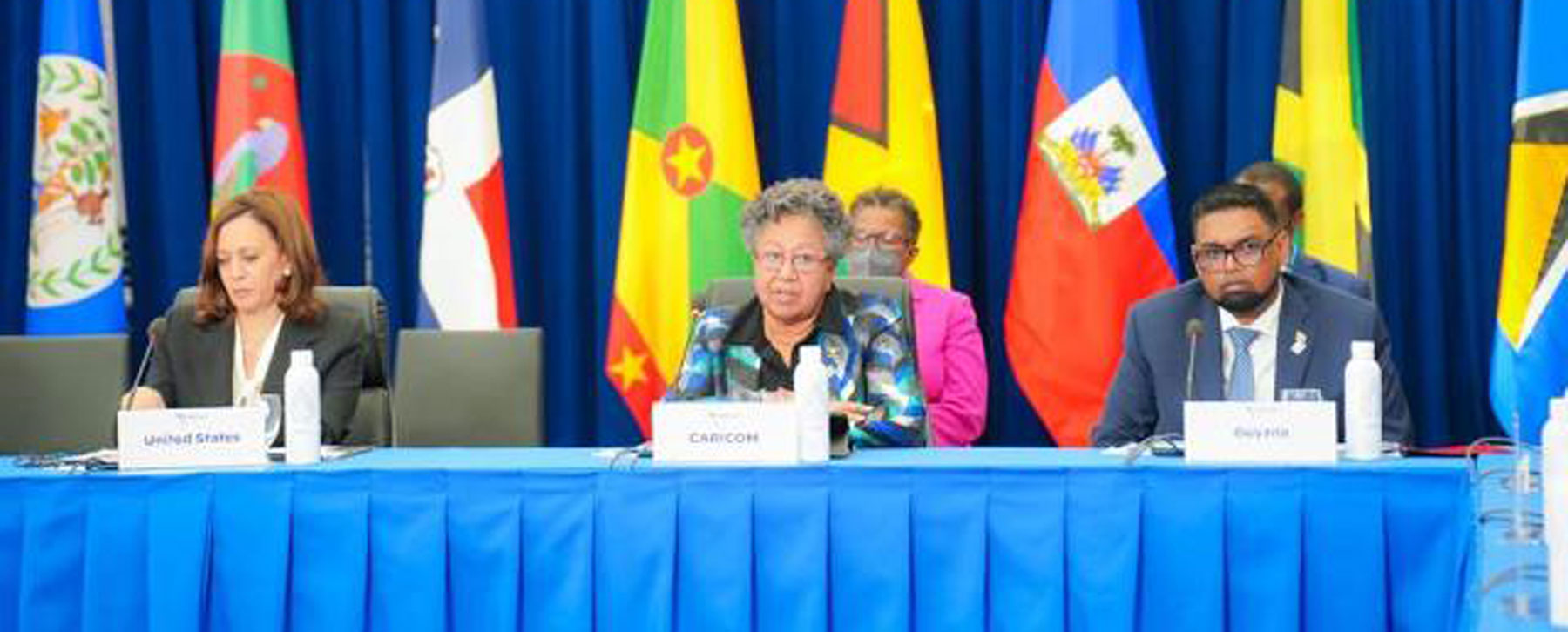LOS ANGELES, California. Thurs. June
9, 2022
Climate Change and the realities of
ever-increasing global temperatures are
currently a prominent topic of
discussions at the 9th Summit of the
Americas taking place in Los Angeles.
Today the Prime Minister of Belize, Hon,
John Briceno, held a meeting with leaders
from CARICOM and Latin America who
had a sit-down with Canadian president
Justin Trudeau. According to a
Facebook post by PM Briceno, during
the meeting he explained a little about
the Blue Bond debt-for-conservation
swap initiative in Belize.
“I explained our Blue Bond initiative
as Belize’s response to debt and fiscally
responsible management as well as
innovative climate change action. Belize
does its part and the developed
countries need to step up and do their
share while lobbying others to do same,”
Prime Minister Briceno stated in his
Facebook post today. When he was
interviewed yesterday, he made a similar
point — telling developed countries that
mere access to loans to address the
various crises will no longer be enough.
“Climate Change is a clear and present
danger for Belize and the Caribbean. The
issues of climate change that have been
caused by the developed countries like
the United States…,” the PM said. He
added, “We are continuing to put
pressure on developed countries like the
United States, Canada, and Mexico, to
be able to do more work to reduce the
Climate Change key on 9th Summit
of Americas agenda
emission that causes the Earth to get
warmer, because we are facing the
consequences.”
He said that recognition of this issue
must be followed by discussions about
the accompanying issue: access to
financing.
“We can’t continue to finance our
way out of crisis. The pandemic is a
good example. We have borrowed a lot
of money in the region, Belize, and by
the time we got into government, it was
already at 133% of GDP. Janet Yellen,
the Secretary of the Treasury, and
Blinken, the Secretary of State, have sent
a letter to the Caribbean. Certainly I got
a letter where they said that they are
prepared to work with the World Bank,
IDB, and other IFIs to make it easier for
countries like ours to access funding at
lower interest rates whenever we are
facing these crises, but for us, it’s more
than that. We cannot continue to borrow
ourselves out of these crises. I believe
that the United States and developed
countries have a moral responsibility to
countries like us; they are the ones that
have caused this problem. We are doing
our part, we are protecting our forest,
we are protecting our ocean space, we
are doing more than they are doing, so
they then now need to be able to give us
the money so that we could continue to
do the work, to do the adaptation
changes that needs to be done…,” the
PM remarked.
In speaking about addressing the
climate crisis, President Joe Biden,
during his remarks at the inaugural
ceremony of the summit, said, “When I
hear ‘climate’, I think jobs — goodpaying,
high-quality jobs that will help
speed our transition — to a green
economy of the future and unleash
sustainable growth; jobs in developing
and deploying clean energy; jobs in
decarbonizing the economy; jobs in
protecting biodiversity of our
hemisphere; jobs that will provide dignity
of being able to feed your family, give
your children a better life, and envision
a future of possibilities.”
Projects aimed at achieving this
include the Renewables in Latina
America and the Caribbean Initiative,
which seeks to accelerate the transition
to clean energy in LAC. The major goal
is to achieve 70% renewable energy
across the region by 2030.
During his official remarks today at
the summit, Prime Minister Briceno
said, “Action must include the Paris
2030 delivery agenda. We demand firm
plans for developed countries for
emission reduction targets in line with
the 1.5 degrees centigrade Paris
Agreement Temperature goal, a plan to
scale up climate finance beyond the
floor of the $100 US billion annually
through 2025, and doubling of
adaptation finance.”
“Today, Vice President Harris
announced the U.S.-Caribbean
Partnership to Address the Climate
Crisis 2030 (PACC 2030). PACC 2030
is the Biden-Harris Administration’s new
initiative involving fresh commitments
to — and integration of — climate
adaptation and resilience and clean
energy programs across the Caribbean
region.” A statement from the White
House noted.
The overarching goals are
Strengthening Energy Security and
Promoting Climate Adaptation and
Resilience, with four pillars intended to
forward those objectives; those include:
Improving Access to Development
Financing, Facilitating Project
Development, and Investment,
Enhancing Local Capacity Building, and
Deepening Collaboration with
Caribbean Partners.
Harris made this announcement in the
Climate Change key on 9th
Summit of Americas agenda
Continued fromPage 3 presence of CARICOM heads of state
today. The first pillar looks at access
to financing.
“Recognizing that access to
financing is critical to achieving the
region’s climate and clean energy
objectives, PACC 2030 will work to
expand existing access to project
financing and unlock new financing
mechanisms to support climate and
clean energy infrastructure development
in the region. Key actions under this
pillar will include increasing U.S.
International Development Finance
Corporation (DFC) financing for
climate and clean energy projects in
underserved Caribbean countries, as
well as collaborating with multilateral
development banks (MDBs) and
multilateral climate and environmental
trust funds to improve the policy
environment and unlock access to
additional infrastructure financing, for
the Caribbean.” The statement from the
White House is outlined in explaining
the first pillar.
CARICOM Secretary-General, Carla
Barnett in her remarks following Harris’
address said, “We are therefore pleased
to have this conversation we are aware
that our own public sector fiscal
constraints limit the extent to which our
governments can finance a transition to
renewables and therefore the
undertaking to provide sources of
financing that our private sector can
access is really very important.”
We will have more on the PACC
2030 initiative in a subsequent issue.

